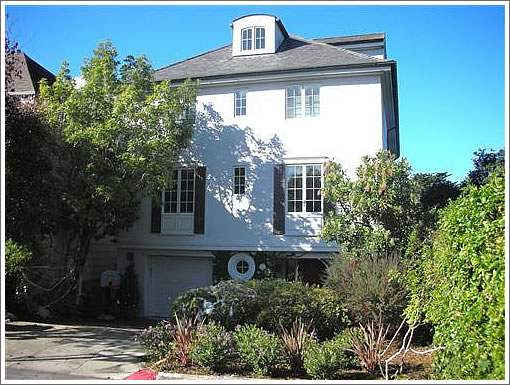
In 2009 a listing for the sale of 25 20th Avenue was entered into the MLS “for comp purposes only” with a reported contract price of $3,500,000, the price which was used for industry sales reports, statistics, and agents’ “due diligence.” Public records, however, suggest the sale closed escrow with a recorded contract price of $3,350,000.
Regardless, two weeks ago the four-bedroom home bordering the Presidio returned to the market asking $3,600,000.
∙ Listing: 25 20th Avenue (4/5) 4,161 – $3,600,000 [MLS]

Lovely house but $3.6???
for “comp purposes only?” ahhh, it’s a great business . . . .
What probably happened here is that the buyer paid the agent’s commission directly out of pocket and not as part of the house. It is tax advantageous because then the tax basis is the cost of the house *minus* the commission, instead of cost of the house *plus* commission as it is in a normal transaction.
You can only structure a deal this way if you have a lot of cash (down payment + commission) because you can’t roll the commission into the loan like you would in a normal transaction.
But of course for comps the agent wants the deal to most closely match the rest of the MLS data. Still, it is an unusually structured transaction and the agent should report it as such.
I actually think breaking it out that way makes sense, but everyone would have to do it, and the cash requirements make it prohibitive for normal buyers.
Pretty lame listing for a $3M+ property. I like the dog in the 4th picture. Is it only the “pent-room” that has ocean views? The remodeling that the current seller is trying to claim was done in 2002.
“for comp purposes only” = “so I could say I sold it at asking.” We’ve already seen the shady things done with other “for comp purposes only”-type listings here.
What is this country coming to, when you can’t trust a real estate agent to be honest?
Thanks Gallileo that makes sense. Thanks to Prop 13, paying commissions separately will save a lot of money over the years, in this case $1800/yr starting out and $2500/yr down the road.
Assuming of course we get more home price inflation in this lifetime.
Given that they buyer sold a year later, and could have put that same money in a CD, they actually lost money by doing this. It only makes sense if you are going to hold for many years.
looks very nice. good seats indeed..
sorry, but can somone please explain to me what it means when the buyer pays for the agent’s commission out of pocket?? I thought the norm was always the seller paying the commission. I’m not disagreeing that there are’t buyers willing to do it, but why would they shell out $140k in this case just to lower the cost basis to save prop. tax. It doesn’t seem to justify. 140 is still 140.
noe, in normal circumstances, the buyer is actually paying both realtors, with the commission flowing through the seller to the realtors as part of the sale price. A buyer can just structure the offer so that the commission portion of his/her payment flows directly to the realtors rather than doing so as part of the sale price. The recorded sale price is then lower.
Actually, in normal circumstances the seller pays the listing agent 5% or so, and then the listing agent pays the selling agent half that. In a circumstance such as this one if all are on board with X amount being taken directly from the buyer’s down payment and routed toward the realtors, directly, then the net amount of monies exchanging hands will be the same. But the sales price will appear lower.
iow, buyer can make offer w/out the use of a broker and that lets the seller off the hook for that half of the commish he would have paid to the ‘buyer’s broker’. a worthwhile strategy imo.
Noe,
As for why you would pay an extra $140K directly when the payoff is only a reduced tax basis:
That isn’t “extra” money–it’s money that will be a part of the deal no matter how the deal is structured. The agent is going to get paid no matter what. So the buyer doesn’t actually spend anything extra, but sets themselves up for a decreased tax bill every year they own the house. That is essentially “free” money to them.
I wonder if this set up could cause the new buyer extra tax liabilities at the time of his own sale? Wouldn’t the taxman know about this trick and claim his pound of flesh?
lol, good point. Since the cost basis has been “lowered,” when time comes for the ‘new buyer’ to sell it would appear as if there were more capital gain. Doesn’t pass the napkin test. Yup, can’t seem to escape ole’ Uncle Sam either way..
Recent buyers don’t have to worry about bumping up against the capital gains threshold anytime soon 😉
Regardless, you’d have a good argument with the IRS that the tax basis includes the broker commissions you paid. That’s the usual rule for computing basis for capital gains purposes. Property tax assessments and capital gains are two different animals.